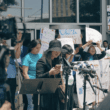The Republican-controlled Senate voted 52-48 to confirm Judge Amy Coney Barrett to the U.S. Supreme Court on Monday night, cementing the judicial body's conservative tilt just days before the November election.
Every Republican senator but one, Susan Collins of Maine, voted to confirm Barrett, while every Democratic senator voted no.
Barrett, a 48-year-old federal appeals court judge nominated by President Trump in September following the death of Justice Ruth Bader Ginsburg, was fiercely opposed by Democratic lawmakers and D.C.-based Asian American and Pacific Islander advocacy groups. Her confirmation marks a major victory for the Republican Party.
“Throughout her career, Barrett has demonstrated a disregard for Asian American and Pacific Islander women’s lives and we expect her to use her new position on the Supreme Court to do more of the same,” Sung Yeon Choimorrow, executive director of the National Asian Pacific American Women's Forum (NAPAWF), said in a statement provided to The Yappie. “But our vision and our fight for a world in which AAPI women have the political, economic, and social power to make decisions regarding our bodies, families, and lives is unwavering.”
What's next
Barrett, whose addition shifts the court’s conservative majority to 6-3, could immediately weigh in on a number of consequential cases, including those related to voting rights, health care, abortion, immigration, and even the 2020 Census.
NAPAWF, one of the AAPI organizations that have been the most critical of Barrett’s nomination, released a factsheet accusing Barrett of promoting racist stereotypes by supporting sex-selective abortion bans and devaluing victims of sexual harassment and violence.
A handful of AAPI organizations, including the Asian Pacific American Labor Alliance and OCA – Asian Pacific American Advocates, also signed onto a letter earlier this month arguing that two million Asian Americans, Native Hawaiians, and Pacific Islanders could lose healthcare coverage if Barrett deals a blow to the Affordable Care Act.
Barrett’s judicial record on immigration has also come under scrutiny. Asian Americans Advancing Justice, an affiliation of five independent civil rights organizations, highlighted Barrett’s support for the Trump administration’s controversial “public charge” wealth test, which allows immigration officers to deny green cards if an applicant used certain forms of financial or social assistance.
“Barrett consistently rules against immigrants seeking relief from deportation,” the affiliation said in a September statement. “She cast the deciding vote permitting the deportation of a lawful resident who resided in the United States for 30 years. As the dissent noted, the law banishing him may violate equal protection under the Fifth Amendment’s Due Process clause.
Separately, the Trump administration is urging the Supreme Court to let it exclude undocumented immigrants from the 2020 census count for the purpose of congressional apportionment. Justices are set to hear arguments on November 30









